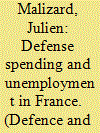| Srl | Item |
| 1 |
ID:
134029


|
|
|
|
|
| Publication |
2014.
|
| Summary/Abstract |
France has received little attention in the literature of defense economics, despite some outstanding features of the country's situation. This study attempts to partially fill this gap with new empirical evidence which evaluates the influence of military expenditure on the unemployment rate between 1975 and 2008. Our estimation is based on the ARDL approach to cointegration. The results reveal that both defense and non-defense spending exert a negative influence on unemployment but that defense spending has a higher negative impact.
|
|
|
|
|
|
|
|
|
|
|
|
|
|
|
|
| 2 |
ID:
187360


|
|
|
|
|
| Summary/Abstract |
This paper examines the main determinants of French defense spending over the period 1958–2017. To estimate the determinants of defense spending, the demand defense literature considers both economic and strategic factors such as conflicts, threats, and alliances. Our approach is original because we focus on strategic factors, including proxies for an alliance’s membership and external threats. In addition, we include transnational terrorism as a proxy for internal threats. We find that defense spending is positively related to the gross domestic product, North Atlantic Treaty Organization membership, military operations abroad, and external threats and negatively linked to the population as a proxy to public service needs. These results are robust to changes in specifications and shifts in defense policy observed after 1991. This contribution underlines that the fundamental determinants of defense policy in France are economic conditions.
|
|
|
|
|
|
|
|
|
|
|
|
|
|
|
|
| 3 |
ID:
190435


|
|
|
|
|
| Summary/Abstract |
n recent decades, many western countries engaged in Military Operations Abroad (MOA), sometimes with over-stretching military engagements such as antiterrorism, peacekeeping, or humanitarian interventions. These aggressive postures pose a heightened risk to future deployment capacities and the ability to ensure a deterrence strategy in the long run. This study investigates a theoretical model to analyze the sustainability of military operations over time. In our setup, we define military capacity as a stock variable that can regenerate itself and deplete when a country engages in MOA. We present a sustainability theorem with the identification of tipping points in the conduct of MOA. Especially, engaging in excessive military operations leads to a relative ‘demilitarization syndrome.’ This underlines a fundamental trade-off between economic conditions and strategic ambitions. The model sheds some light on the dynamics of the military capabilities of a group of major western military powers.
|
|
|
|
|
|
|
|
|
|
|
|
|
|
|
|
| 4 |
ID:
120395


|
|
|
|
|
| Publication |
2013.
|
| Summary/Abstract |
The aim of this article is to explore the defense-growth relationship in France. In particular, in the context of the crisis, we would like to compare the effects of military and nonmilitary spending on growth. Our results reveal that this is a complex relationship with a bidirectional causality. In the long run, defense expenditure exerts a positive influence and outperforms the impact of nondefense expenditure. However, an opportunity cost arises in the short run.
|
|
|
|
|
|
|
|
|
|
|
|
|
|
|
|